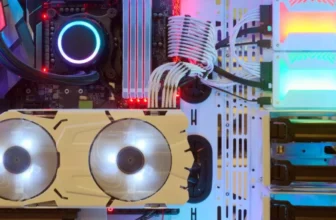
If you’ve ever pondered over whether to go for an AMD or Intel CPU for your gaming rig, you’re not alone. The distinction between the two goes beyond just brand names. Each has its strengths and weaknesses, impacting your gaming experience in various ways. From raw processing power to pricing considerations and even future-proofing your setup, the choice between AMD and Intel can significantly affect your gameplay. So, before you make that all-important decision for your gaming PC, let’s delve into the nuances of AMD versus Intel CPUs and how they can shape your gaming journey.
Performance Variance
When comparing AMD and Intel CPUs for gaming PCs, understanding the performance variance between the two is crucial for making an informed decision. AMD processors often excel in multitasking and multi-threaded applications due to their higher core and thread counts. This means that tasks such as video editing or streaming while gaming can be smoother on AMD CPUs.
On the other hand, Intel CPUs are known for their strong single-core performance, making them ideal for games that rely heavily on single-threaded performance.
In gaming, where high frame rates and quick response times are essential, Intel CPUs tend to have a slight edge in certain titles. Games that are more optimized for single-core performance may run slightly better on Intel processors. However, the difference in gaming performance between AMD and Intel CPUs may not always be noticeable, especially at higher resolutions or graphics settings where the GPU plays a more significant role.
Ultimately, the best choice between AMD and Intel CPUs for gaming PCs depends on your specific needs and budget.
Price and Value
Moving on to the aspect of price and value, considering the cost-effectiveness of AMD and Intel CPUs for gaming PCs is key in determining the most suitable option for your needs. AMD typically offers better value for budget-conscious gamers, providing solid performance at a lower price point compared to Intel. If you’re looking to build a gaming PC without breaking the bank, AMD CPUs might be the way to go.
On the other hand, Intel CPUs tend to be more expensive but can offer slightly better performance in certain gaming scenarios.
When weighing price and value, it’s essential to consider your specific gaming requirements. If you prioritize raw performance and are willing to pay a premium for it, an Intel CPU might be the better choice. However, if you’re looking for a more budget-friendly option that still delivers excellent gaming performance, AMD CPUs could provide the value you seek.
Ultimately, the decision between AMD and Intel CPUs for gaming PCs comes down to your budget constraints and performance preferences.
Overclocking Capabilities
To optimize your gaming PC’s performance, understanding the overclocking capabilities of AMD and Intel CPUs is crucial. Both AMD and Intel offer overclocking features on some of their processors, allowing you to push the CPU beyond its base clock speed for increased performance.
AMD CPUs, especially those in the Ryzen series, are known for their excellent overclocking capabilities. The unlocked multiplier on many AMD processors makes it easier for users to overclock without much hassle. Additionally, AMD CPUs generally run cooler when overclocked compared to Intel CPUs, providing a bit more headroom for performance boosts.
On the other hand, Intel CPUs, particularly those with a ‘K’ at the end of the model number, are designed for overclocking. Intel’s Turbo Boost technology also dynamically increases the clock speed for single-core performance. While Intel CPUs can deliver high clock speeds when overclocked, they tend to run hotter than AMD counterparts, requiring better cooling solutions for stable performance.
Ultimately, when considering overclocking capabilities, AMD CPUs offer easier and cooler overclocking experiences, while Intel CPUs excel in reaching higher clock speeds with the right cooling setup.
Compatibility and Upgradability
Understanding the compatibility and upgradability of AMD and Intel CPUs is essential for maximizing the longevity and performance of your gaming PC. When considering compatibility, AMD CPUs often require motherboards with the AM4 socket, whereas Intel CPUs typically need motherboards with LGA 1200 or other specific sockets. This means that if you plan to upgrade your CPU in the future, you must ensure that the new CPU is compatible with your existing motherboard.
In terms of upgradability, AMD CPUs generally offer better longevity due to their commitment to maintaining compatibility with certain motherboard sockets for several CPU generations. On the other hand, Intel CPUs may require a motherboard upgrade more frequently to accommodate new CPU releases. When choosing between AMD and Intel for your gaming PC, consider not only the current compatibility but also the potential for future upgrades without having to change your motherboard, ensuring you get the most out of your system in the long run.
Gaming














